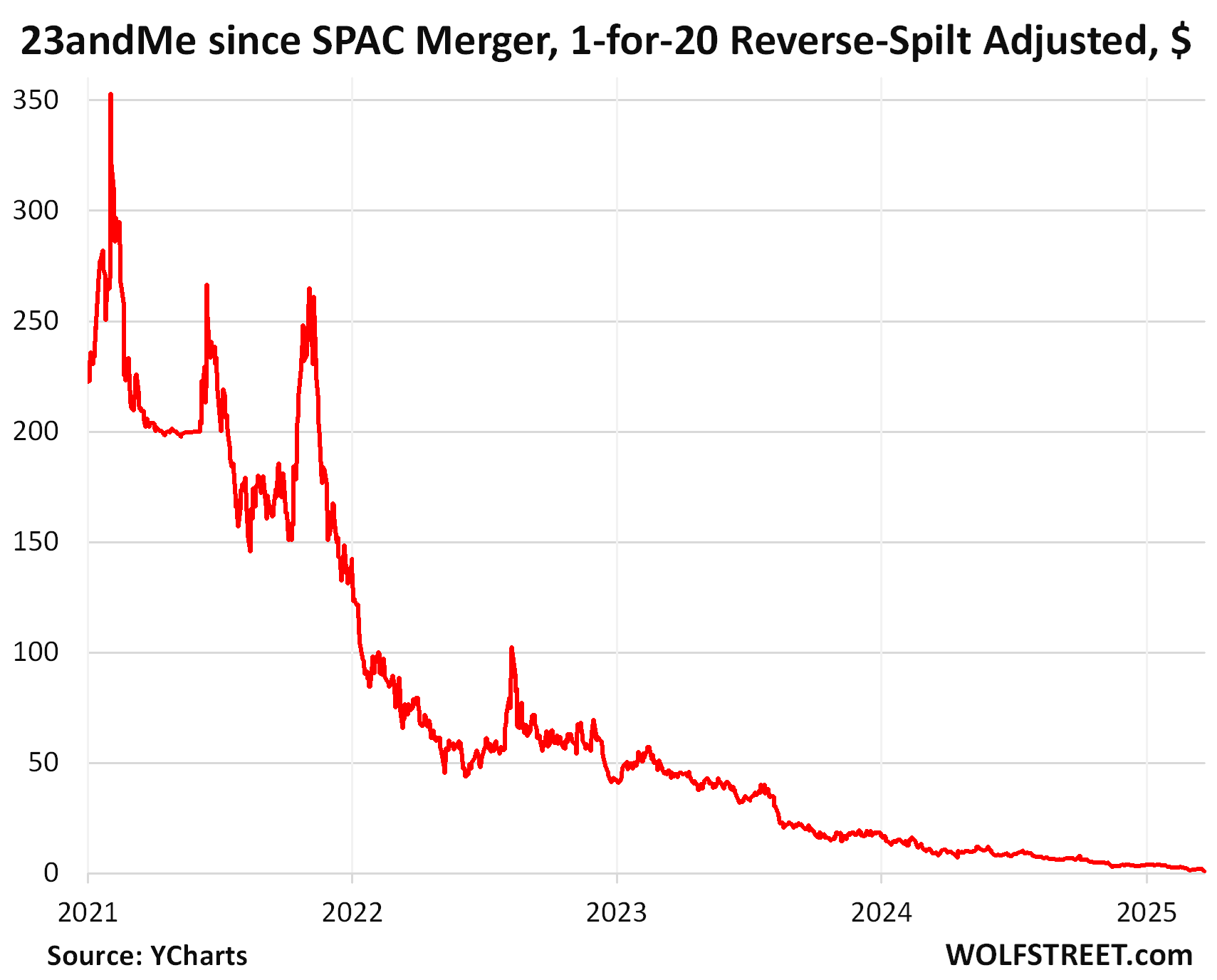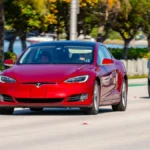Energy News Beat
California Attorney General urges Californians to direct 23andMe to delete their genetic data and samples.
By Wolf Richter for WOLF STREET.
Genetic testing and data collection company 23andMe, which had gone public via merger with a SPAC in 2021, finally filed for bankruptcy today. Shortly after the announcement of the company’s merger with Richard Branson’s SPAC in February 2021, the SPAC’s market cap reached $6 billion. Now, the outfit is valued at $19 million.
Branson’s SPAC went public via IPO at $10 a share in late 2020. It then acquired 23andMe at the company’s peak in revenues. The 1-for-20 reverse stock split last October turned each 20 shares [ME] into one share, and thereby turned the SPAC’s IPO price of $10 into $200. And today’s price of $0.73 would be $0.037 on a pre-reverse-split basis.
After the total collapse since late 2021, today’s additional drop of 59% doesn’t even show up on the chart. 23andMe failed because its business model failed, and that was already clear before going public, but it didn’t matter because it was the time of free money and consensual hallucination about SPACs and other assorted creatures (data via YCharts).

From 2020 through the first three quarters of the current fiscal year, the company had net losses of $1.79 billion. Annual revenues fell by 28% from the peak in 2020 through the last fiscal year.
In advance of the bankruptcy filing, the company secured a $35 million debtor-in-possession (DIP) loan commitment from JMB Capital Partners Lending. The DIP loan puts JMB in a senior position on liens ahead of prior lenders.
In the bankruptcy filing, the company has petitioned the court to allow it to pay employees, vendors, and suppliers, and requested approval to exit various contracts, including office leases in Sunnyvale and South San Francisco.
Co-founder Anne Wojcicki tendered her resignation as CEO by “mutual agreement” between her and the special committee, effective March 23 evening, but remains on the Board as a Class III director. CFO Joe Selsavage, was appointed interim CEO.
Wojcicki, who until 2015 was married to Google co-founder Sergey Brin, has been offering to buy out the company at a price lower even than today’s closing price – most recently in March at 41 cents a share, or at $11 million. Those efforts were rejected by the board.
In September, the company’s independent board members quit en masse over these take-private efforts. By then, the end was already palpable.
The company implemented serial layoffs, including last November when it cut 40% of its remaining staff and scuttled Wojcicki’s efforts to diversify the business model by using the genetic data it had collected from its 15-million users to develop therapies and offer personalized medical care.
DNA data is the most personal and unique data there is, and users paid to give it away, and now that data resides with 23andMe and will get auctioned off in bankruptcy court. Some of the data has also been sold to drug development companies over the years in supposedly anonymized form. Hackers obtained some of the data in 2023. Police also obtained DNA data from some specific customers.
For customers, this is more than just one of the countless heroes in our pantheon of Imploded Stocks.
California Attorney General Rob Bonta “urgently” issued a “Consumer Alert for 23andMe Customers,” telling Californians that under the state’s “robust privacy laws,” they “have the right to direct the company to delete their genetic data.”
“I remind Californians to consider invoking their rights and directing 23andMe to delete their data and destroy any samples of genetic material held by the company,” said the alert, which gave 9-step instructions on how to do that.
That would obviously be a good idea. But deleting data on a computer isn’t that clear-cut. Unless data are actually overwritten, the data is still there but just doesn’t show up in the directory anymore. There is no way to check if the data was actually overwritten.
The company said in its bankruptcy press release: “Any buyer will be required to comply with applicable law with respect to the treatment of customer data and any transaction will be subject to customary regulatory approvals, including, as applicable, approvals under the Hart-Scott-Rodino Act and the Committee on Foreign Investment in the United States.”
Which is, like, very reassuring? So maybe a Chinese company wouldn’t be allowed to buy the data?
The company was hacked in October 2023, and genetic data of what now has grown to nearly 7 million customers was exposed. The hacker was offering some of the genetic data on the dark net. The company subsequently agreed to settle a lawsuit related to the hack for $30-million.
In a bankruptcy auction, the buyer of the assets – primarily the genetic data – would shed any claims stemming from the hack.
In 2018, big pharma company, GlaxoSmithKline [GSK] invested $300 million in 23andMe and signed an “agreement to leverage genetic insights [the genetic data] for the development of novel medicines.” At the time, 23andMe had “over 5 million customers,” the press release went on to say, adding that “23andMe customers can also choose to participate in research and contribute their information to a unique and dynamic database, which is now the world’s largest genetic and phenotypic resource.”
On the other hand, people can still pay to hand their DNA to the company. It is now running a special for its “Premium” annual subscription for $199 for the first-year, with a $68 renewal, including the genetic test.
Here’s a screenshot of part of that page, for posterity:

The big problem that 23andMe has always had is its business model. DNA tests are a once-in-a-lifetime thing. One test is all people need to see their ancestry data. And not everyone wants to surrender their genetic data. Maybe it was a cool thing at first, and then people started thinking about the implications? So demand from consumers has dropped.
The company tried to come up with subscription models, veering into healthcare and offering more than just genetic tests, but it just didn’t lead to a big revenue stream, and revenues continued to decline. Its genetic drug discovery adventure never led anywhere, but burned up a huge amount of cash. And licensing the genetic data from its customers to pharmaceutical companies for drug development also failed to produce that big revenue stream.
Enjoy reading WOLF STREET and want to support it? You can donate. I appreciate it immensely. Click on the mug to find out how:
![]()
The post SPAC Implosion Keeps on Giving: Genetic Data of 15 Million Customers up for Grabs at 23andMe Bankruptcy Auction appeared first on Energy News Beat.










